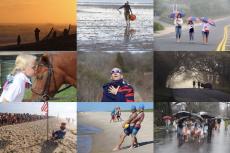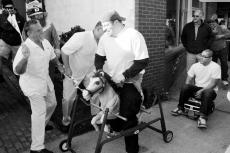The American Red Cross in the Greater New York Region is seeking up to 1,000 new volunteers to be part of its inaugural Hurricane Season Reserve Corps. A minimum of three hours' training is provided virtually for this new group of team members, who will be prepared to support affected communities in the event of a major disaster.
This large number of reserve volunteers is needed as Covid places obstacles in the way of an already intense forecast for the 2020 Atlantic hurricane season, which began on June 1 and runs through Nov. 30.
"I attended an emergency response webinar last week, which brought it to my attention. Afterward we agreed to try and promote this and generate volunteers locally," New York State Assemblyman Fred W. Thiele Jr. explained. "We have a longstanding relationship in partnering with the Red Cross and are just trying to get word out."
"It's already been a busy season," said Neela Lockel, the C.E.O of the American Red Cross on Long Island. "It's already been a taxing month on everyone, but in the current environment it's also a little more complicated," she said, pointing to the recent western wildfires as well as storms in areas like Texas, Louisiana, and northern Florida.
Long Island itself is among the vulnerable regions, she said, and the need for "people power" is acute. The Red Cross has agreements and partnerships with all local offices of emergency management, and "we have identified 25 shelter locations across Suffolk County; 10 of them are east of Riverhead", she said, mostly schools and some colleges, places out of a flood zone with a capacity amenable to Covid precautions.
"If there was a storm that impacted the area and perhaps 100 folks needed shelter, now we need two shelter locations and then that means double the staff. Of course, because of coronavirus, it makes it harder for people to go out and volunteer."
She noted that in the first couple of days of an event, there is a little more lenience, but quickly the organization must make sure it is not exceeding capacity in any space.
Operationally, the Red Cross is not working in the same numbers as it normally would on account of the staffing issues presented by travel at this moment in time. Ms. Lockel said there are six shelters out west and in the south, which have been "challenging" in the current climate. Where possible, the Red Cross is putting people up in hotel rooms.
"If there is something really large and significant, there might have to be a shelter type setting, but the idea is that we can get people out as quickly as possible."
Hotels are not so much a viable response method on the East End, "that's why our shelter locations are incredibly important for us to have identified," Ms. Lockel said. Accordingly, her priority is to have people ready and trained to staff these possible shelter locations in order to get people through the worst of any potential danger.
After signing up at redcross.com and three hours of virtual training, which can be done "at somebody's leisure," Ms. Lockel explained, "you have what you need to get started if we need you."
She wants people who can say to themselves, "I think that I have my ducks in a row. If a disaster should hit, as long as my family and I are okay, I would be willing to help my neighbors, who might not be in the same boat, and sign up for some shifts."
"The coronavirus pandemic will make it challenging to deploy trained disaster volunteers from other parts of the country should an emergency occur. In light of this, the Red Cross is asking you to be ready to help your community," said Susan Rounds, the interim C.E.O. of the American Red Cross in Greater New York. "Train now to be a Red Cross volunteer and answer the call to help if the need arises here in our region."
There is still a lot of work that has to be done remotely, Ms. Lockel said, so there are volunteer opportunities for those who cannot move around freely. Virtual volunteers assist with casework via phone and sometimes using social distancing.
"The biggest need that we have, quite honestly is for people to be able to work in a shelter," Ms. Lockel said. Shelter volunteer work includes collecting information, working at reception, registration, the dormitories, or in a team of people who get meals packaged and delivered. Volunteers also help to distribute those things and manage the space in accordance with new precautions for Covid.
Health service support is also needed. Registered nurses, licensed nurse practitioners, physician assistants, paramedics, and emergency medical technicians with an active, current, and unencumbered license are among those being called upon. Roles are also available for certified nursing assistants, certified home health aides, student nurses, and medical students. The Red Cross needs volunteers who can provide care as delegated in shelters by a licensed nurse.
Ms. Lockel said the assistance with "daily living" is "really what we tap into our health services for." This sort of aid might include personal assistance services, health education, replacing medication, and finding durable medical equipment or consumable medical supplies as necessary.
Health service volunteers are also needed in shelters to help assess people's health. Daily observation and health screening for Covid-like illness among shelter residents may also be required. R.N.s supervise all clinical tasks.
The Red Cross calls potential volunteers to arms with the fact that 90 percent of the Red Cross work force comprises volunteers. "So many of our volunteers are so highly trained and can really run these operations with great experience and ease," said Ms. Lockel. There are both associate and supervisory-level opportunities available.
"I can't reinforce enough how huge the need is to make sure we have people trained and ready." Ms. Lockel highlights the fact that since it is not known when a Covid-19 vaccine will be out and when so many restrictions will change or be lifted, this work is "really not just in preparation for this year, but potentially for the next year as well."
The Red Cross asks people to think about things in advance. Important preparatory questions include, "What is your emergency plan?" and "If you live in a low-lying region and are potentially at risk if a big surge hit Long Island, who could you call, where could you go?"
"What would you need?" is another question to which Covid supplies an even more niche answer. Packing lists for Red Cross volunteers now must include masks, personal protective equipment, antibacterial wipes, and hand sanitizer, "so we can be out doing what we need to do in as safe as possible a way," said Ms. Lockel.
"The worst possible thing is to be unprepared."




